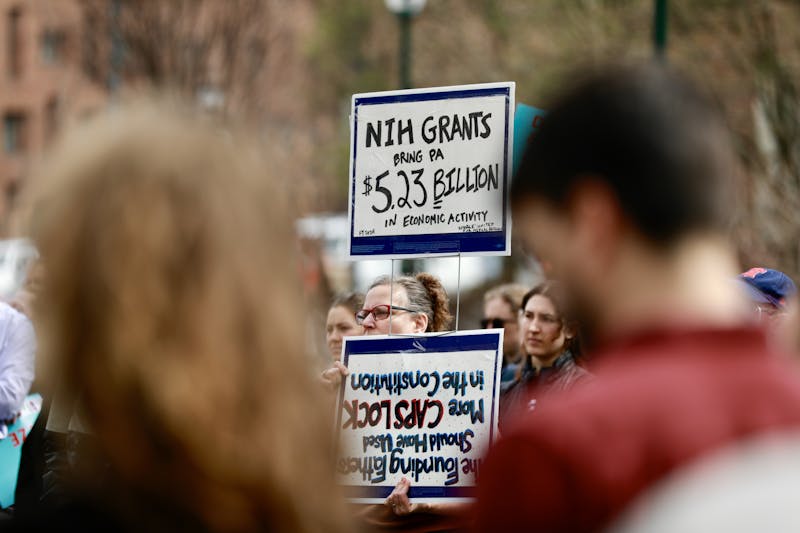Grads question role at Penn Grads question role at PennUnlike the majority of undergrads, graduate school students rarely participate in University activities or campus events leaving may asking? They may not promote their latest events on Locust Walk, socialize on College Green or cheer at every football game -- but it's probably because they don't have the time. As graduate and professional students at the University, they make up approximately half of the student population at Penn -- but often, they remain less visible than their undergraduate peers. While undergraduates do not always understand the role of graduate and professional students in campus life, graduate students themselves say they aren't sure how they fit into the University as a whole. Many point out that their experience inherently differs from undergraduate life. "I don't think that grad students will ever feel about Penn the same way undergrads do," Linguistics doctoral student Victoria Tredinnick said. Tredinnick, president of the Graduate Student Associations Council, said graduate students are at a different point in their lives. "We had our undergrad years and now we're here to do what we plan to do with our lives," said second-year Dental student Heidi Tarshis. Others noted that it is impossible to pinpoint a single identity for graduate and professional students. Instead, their connections to the University vary as widely as the 12 post-graduate schools and almost innumerable departments. Tredinnick said doctoral students, who spend an average of six years in their programs, still have a central role at the University. "In terms of the intellectual life, we really feel that we're at the heart of it," she said. Vice Provost for Graduate Education Janice Madden said she agreed. "I think that graduate students have a very strong place at this University," she said. "Virtually every faculty member feels? [graduate students are] part of the core of this place." Graduate students often become very close to their individual departments, which become like a "home," according to Tredinnick. She added that they develop a "psychological closeness [to their departments] that undergrads may not have." Law School Assistant Dean of Student Affairs Gary Clinton said that feeling is similar to the connection professional students have to their schools, noting that the Law School includes "800 people working on the same thing." "The professional schools tend to be self-contained worlds unto themselves with very vigorous programs," Clinton said. The insular nature of professional schools affects the way those students view their place in the University. "One thing that is both good and bad about Wharton is that it provides almost everything you need," said first-year Wharton graduate student David Scott, pointing out that his fellow students do not have to go beyond the confines of Wharton for most resources. Tarshis, the Graduate and Professional Student Assembly's social chairperson, said the School of Dental Medicine forms its own community, allowing students to "get to know everyone in the school? including the security guards." Many professional students attribute their school-driven identity to the extremely difficult academic program. "Our schedule is so intense? [that] we have a hard time getting involved in our own school, nonetheless the rest of the University," said Veterinary Medical Student Government President Dorothy Kielkopf, a third-year Veterinary student. Scott added that the Wharton graduate student's schedule typically includes class from 9 a.m. to 3 p.m., with other optional activities like corporate presentations and clubs -- until midnight. He added that the school's administrators often tell students: "You won't [even] have time to do all the things you want to do in Wharton." Unlike many undergraduates, professional students often must carry the financial burden of their studies. Graduate School of Fine Arts Student Council Vice President Warren Claytor said this mentality encourages students to "try to get in as much work as you can in your time here," often preventing them from looking beyond their own programs to the rest of the University. "As a graduate student you are investing in yourself financially," said Claytor, an Architecture and Landscape Architecture and Regional Planning graduate student. Communication doctoral student Emory Woodard said many graduate students feel that their coursework resembles a job. "The school experience is encapsulated in that nine-to-five experience," Woodard said. He added that the graduate and professional students who commute to campus each day particularly feel limited to that schedule. But distance from campus does not necessarily determine how active a graduate student may be or how connected to the University he or she feels. Doctoral students who have offices on campus spend approximately 12 hours a day at the University, according to Tredinnick. She explained that since they already spend so much time on campus, their off-campus residences have less significance in their connection to the University. Kielkopf added that involvement is often more "attitudinal than geographical," noting that there are always some students who overcome other factors and become involved in campus life.
The Daily Pennsylvanian is an independent, student-run newspaper. Please consider making a donation to support the coverage that shapes the University. Your generosity ensures a future of strong journalism at Penn.
DonatePlease note All comments are eligible for publication in The Daily Pennsylvanian.







